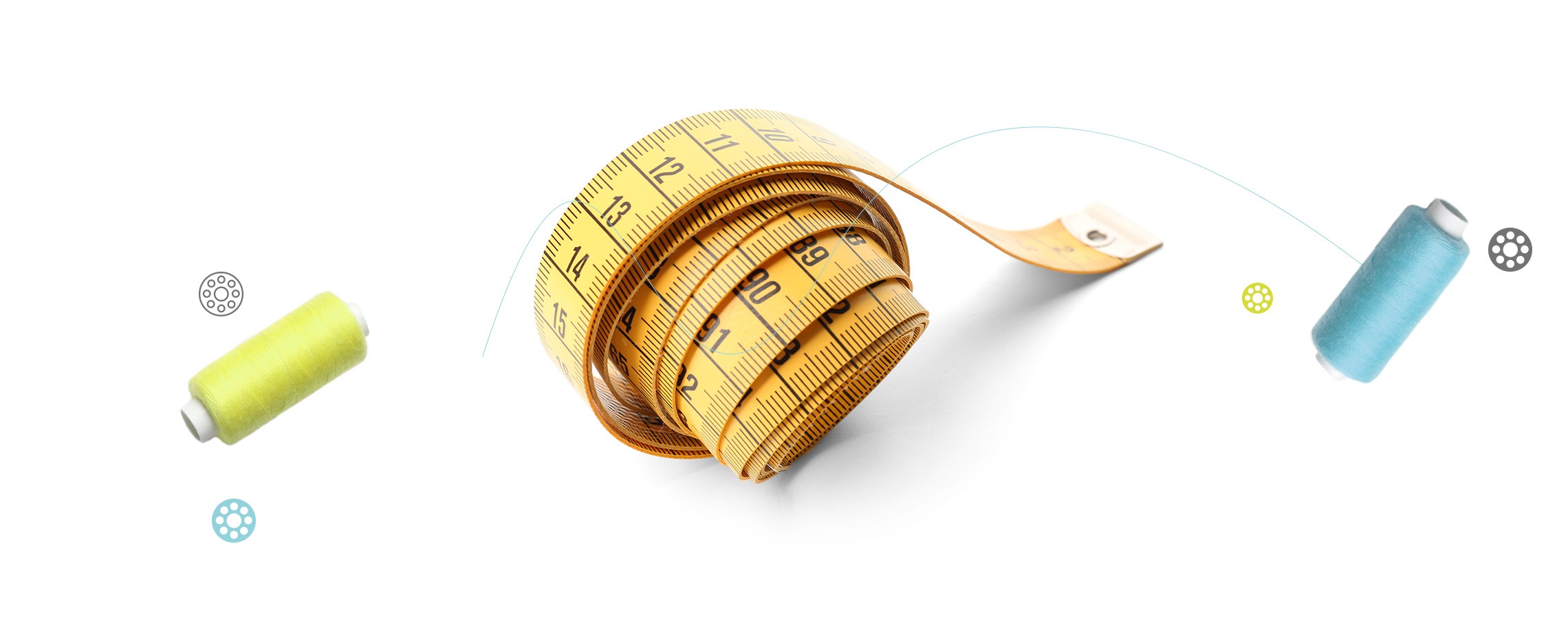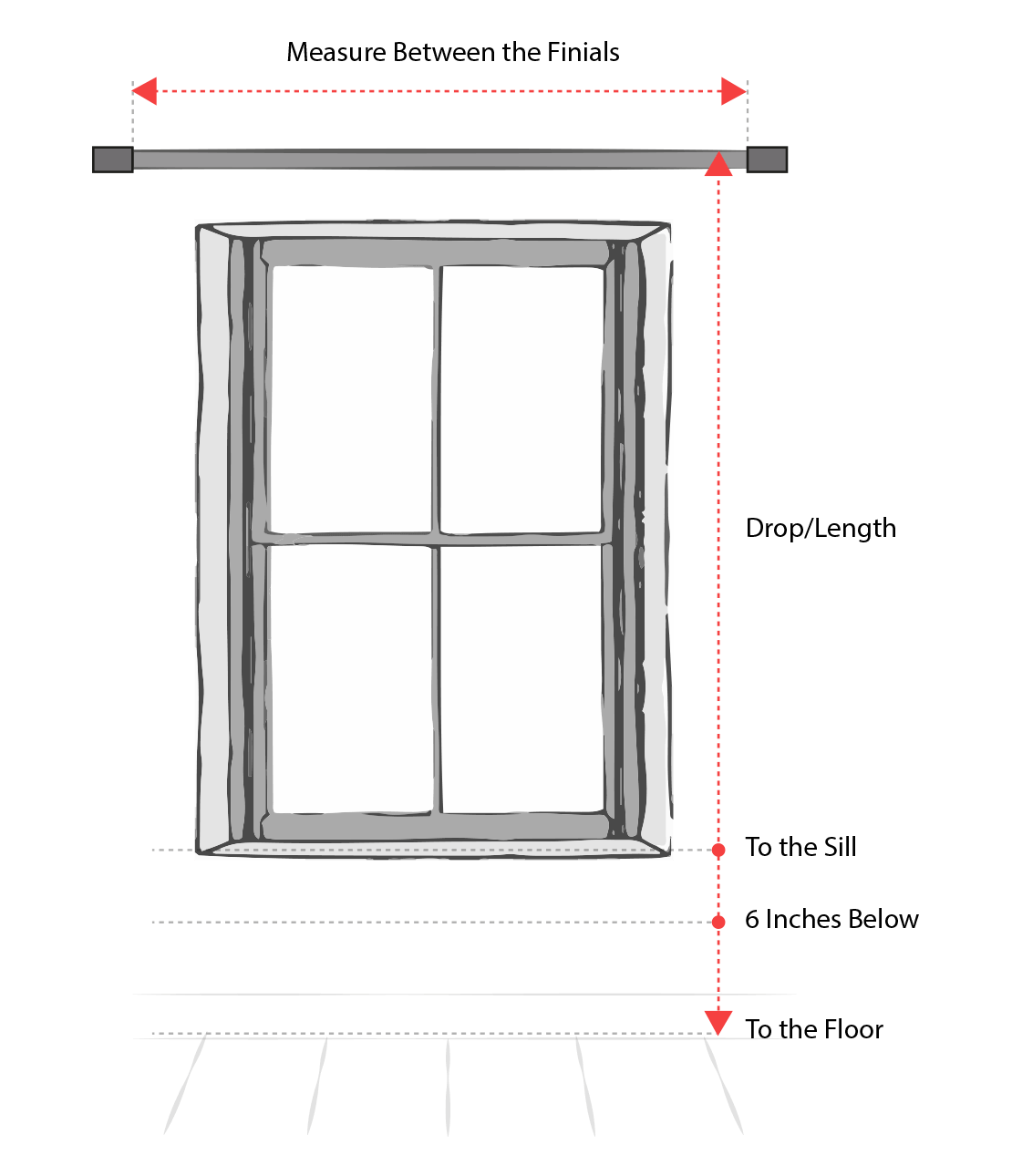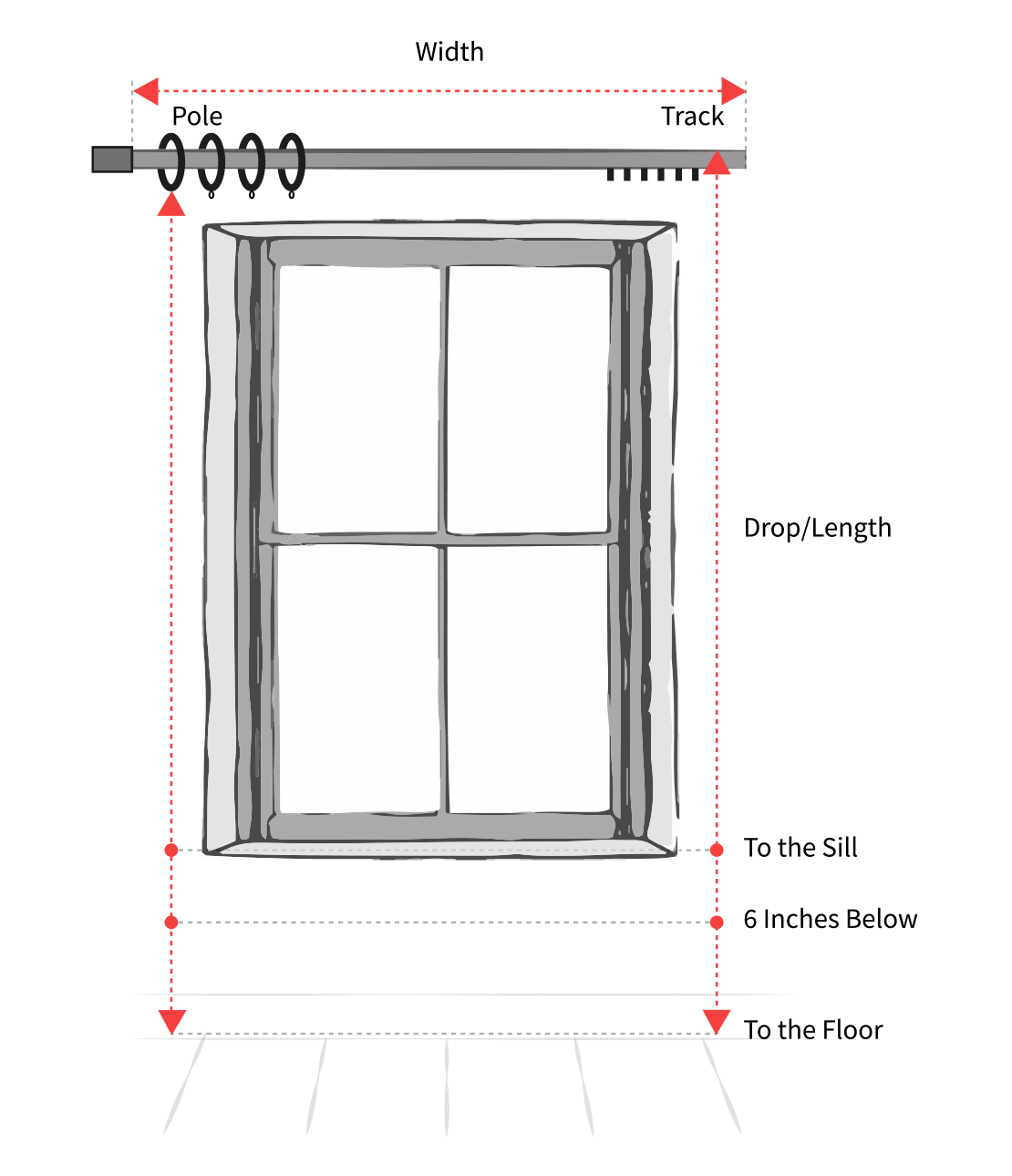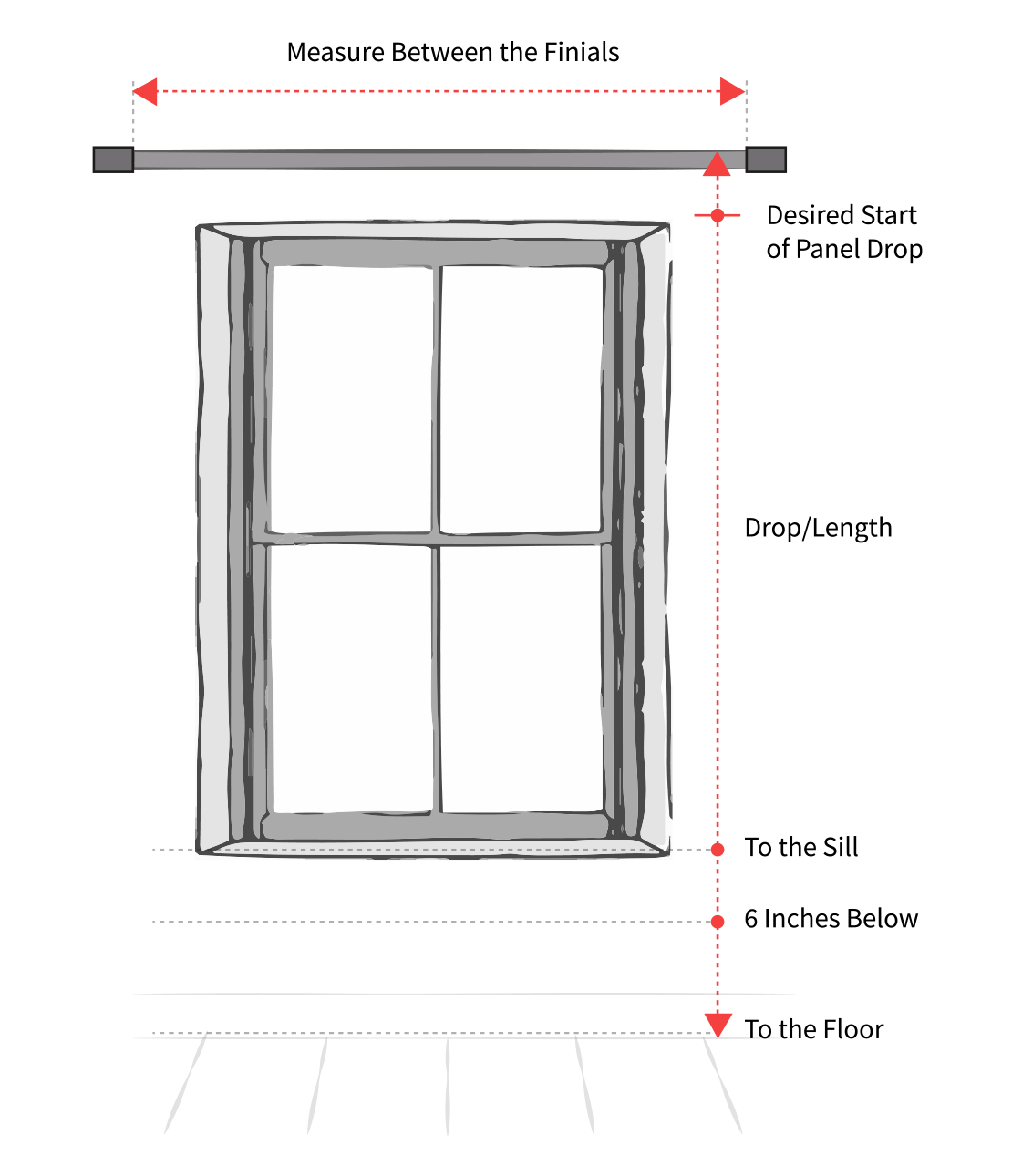
How to Measure Curtain Length & Width
In matters of custom drapery, size does matter. From grommet curtains to pinch pleat drapes, each style has its own nuances when it comes to measuring. Unless you know how to measure and specify accurate curtain sizes, your windows may look less than loved. To help our clients measure curtain sizes accurately for best possible look, our in-house stylists bring you a detailed guide on how to measure curtains. We hope the tips below will help you provide us with accurate specifications for your new curtains from Spiffy Spools. If you have any questions about sizing, please don’t hesitate to contact us at info@spiffyspools.com.
BEFORE YOU GET STARTED….
SPIFFY TIP #1: For the most accurate measurements for curtain lengths and widths, use a steel tape measure. A fabric or plastic tape can stretch over time and will not provide the accurate reading you require to obtain perfect specifications.
SPIFFY TIP #2: Most fabric bolts come in standard widths of 54 inches. This means that most non-pinch pleat curtain panels more than 48 inches wide and pinch pleat panels more than 20 inches wide will have vertical joining hems to achieve the necessary width.
SPIFFY TIP #3: We do *not* require measurements for your windows, frames, poles or tracks. Instead, when ordering from Spiffy Spools, please enter the precise final sizes of the ready curtain panels you’d like us to stitch.
SPIFFY TIP #4: Prices on our site are per curtain panel, *NOT* per pair. To get a pair, please purchase 2 units.
SPIFFY TIP #5: “Length Fraction” in our specification form on ordering pages refers to ‘part inch’ measurements. For example, if you’d like to specify curtain length of 86.50 inches, please choose “86” under “Length” specification and “1/2″ (.50 inch)” under “Length Fraction” dropdown.
SPIFFY TIP #6: If you’re measuring for more than one window, measure each one individually – never assume that your windows are the same size, even if they may look alike.
When it comes to hanging curtains, there’s no room for error. Always double-check your measurements to make sure they’re correct, especially if you’re investing in custom tailored curtains!
Heading Style







Grommet Curtains
Length: For grommet curtains, measure from *top* of your curtain pole/rod to the desired endpoint. Then add 1.5 inches to this measurement. This should be the final length provided to us in your custom order specifications. The extra 1.5 inches added at the end is to account for the ‘upstand’ in grommet curtains – the part of the fabric that stands above the curtain rod. These steps will help you reach the perfect measurement for curtain lengths.
Spiffy Tip: “Length Fraction” in our curtain ordering pages refers to ‘part inch’ measurements. For example, if you’d like to order curtains that are 86.50 inches long, please choose “86” under the “Length” specification and “1/2″ (.50 inch)” under the “Length Fraction” dropdown.
Width: While the width is a personal preference to some extent, our general guideline for grommet curtains is to order panels that are double the width of your curtain pole/track. For example, if your curtain pole is 36 inches wide, we suggest two panels of 36 inches *each*, and not two panels of 18 inches each. This will get you a luxurious fall/gather. If your drapery pole is 36 inches wide and you order curtain panels that are also 36 inches wide altogether, they will hang absolutely flat with no pleats or gather.
For a high level of fullness, order up to three times the width of the pole. If you are looking for less than average fullness and/or to economize on budget, 1.5 times should also be acceptable.
Up to three times width is also highly recommended for sheers and lightweight fabrics such as our linens. These fabrics have less body volume and therefore need more width to attain the same full look as fabrics such as cotton and polyesters. More width also helps enhance privacy where sheers are in use.
Spiffy Tip: Most fabric bolts come in standard widths of 54 inches. This means that all grommet top panels more than 48 inches wide will have vertical joining hems to achieve the extra specified width. These necessary seams are industry-standard and tend to ‘hide’ in pleats. However, if you’d like to avoid them, consider ordering multiple narrow panels over a pair of extra wide panels. READ MORE.
Tab Top, Back Tab Top & Rod Pocket Style Curtains
Length: For rod pocket top (without header frill), back tab top and tab top style drapery, measure length from *top* of your curtain pole/rod to the desired end point. This should be the final length provided to us in your custom order specifications.
Spiffy Tip: “Length Fraction” in our curtain ordering pages refers to ‘part inch’ measurements. For example, if you’d like to order curtains that are 86.50 inches long, please choose “86” under “Length” specification and “1/2″ (.50 inch)” under “Length Fraction” dropdown.
Width: While width is a personal preference to some extent, our general guideline for tab top, back tab top and rod pocket curtains is to order panels that are double the width of your curtain pole/track. For example, if your curtain pole is 36 inches wide, we suggest two panels of 36 inches *each*, and not two panels of 18 inches each. This will get you a rich fall/gather. If your drapery pole is 36 inches wide and you order curtain panels that are also 36 inches wide altogether, they will hang absolutely flat with no pleats or gather.
If you are looking for less than average fullness and/or to economize on budget, 1.5 times should also be acceptable.
While we recommend 3x fullness for an opulent look in rod pocket style, we do not recommend more than 2x fullness for tab tops and back tab tops as the tabs restrict ‘bunching’ of fabric somewhat at top and therefore panels do not gather as neatly with too much width.
Spiffy Tip: Most fabric bolts come in standard widths of 54 inches. This means that all curtain panels in these styles, if more than 48 inches wide, will have vertical joining hems to achieve the extra specified width. These necessary seams are industry-standard and tend to ‘hide’ in pleats. However, if you’d like to avoid them, consider ordering multiple narrow panels over a pair of extra wide panels. READ MORE.
Rod Pocket Style with Header Top
Length: For rod pocket tops with a header frill, measure length from *top* of your curtain pole/rod to the desired end point. Add 1.5 inch to this number to account for a 1.5 inch header frill on top. This should be the final length provided to us in your custom order specifications.
Spiffy Tip: “Length Fraction” in our curtain ordering pages refers to ‘part inch’ measurements. For example, if you’d like to order curtains that are 86.50 inches long, please choose “86” under “Length” specification and “1/2″ (.50 inch)” under “Length Fraction” dropdown.
Width: While width is a personal preference to some extent, our general guideline for rod pocket curtains is to order panels that are double the width of your curtain pole/track. For example, if your curtain pole is 36 inches wide, we suggest two panels of 36 inches *each*, and not two panels of 18 inches each. This will get you luxurious fall/gather. If your drapery pole is 36 inches wide and you order curtain panels that are also 36 inches wide altogether, they will hang absolutely flat with no pleats or gather.
For high level of fullness, order up to three times the width of pole. If you are looking for less than average fullness and/or to economize on budget, 1.5 times should also be acceptable.
Up to three times width is also highly recommended for sheers and lightweight fabrics such as our linens. These fabrics have less body volume and therefore need more width to attain the same full look as fabrics such as cottons and polyesters. More width also helps enhance privacy where sheers are in use.
Spiffy Tip: Most fabric bolts come in standard widths of 54 inches. This means that all rod pocket panels more than 48 inches wide will have vertical joining hems to achieve the extra specified width. These necessary seams are industry-standard and tend to ‘hide’ in pleats. However, if you’d like to avoid them, consider ordering multiple narrow panels over a pair of extra wide panels. READ MORE.
Flat Panel Top Curtains
Length: Flat panel drapery is hung using either drapery pins that are inserted in the header tape at back, or with curtain clips that are pinched on the top hem.
For flat panels to be mounted with drapery pin and hook mechanism on a track, length should be measured from the top of the track up to the desired endpoint. This will allow for length to cover and hide the track itself. If you’d like your track to be visible, measure from the bottom of track to the desired endpoint. If hanging on a pole, length should be measured from the underside/bottom of the pole.
For panels to be hung with curtain clips, measure length from the *bottom* of the curtain clip to the desired end point. This should be the final length provided to us in your custom order specifications.
In summary, to some extent, the final length of drapery for a flat panel top is determined by personal preference. Clients measure lengths based on whether they want their hardware to ve visible or hidden by the fabric.
The header tape we sew at back of flat panel tops is 4 inches wide. It allows for drapery pins to be inserted at three different points, offering clients some flexibility to adjust the final mount position at time of installation.
Spiffy Tip: “Length Fraction” in our curtain ordering pages refers to ‘part inch’ measurements. For example, if you’d like to order curtains that are 86.50 inches long, please choose “86” under “Length” specification and “1/2″ (.50 inch)” under “Length Fraction” dropdown.
Width: Most clients ordering clip tops tend to favor a somewhat flatter look for their drapery with less than average gather/fullness. Therefore by default, most customers order panels that are 1.5 times the width of their curtain rod/pole. For example, for a curtain pole/window that is 36 inches wide, two panels of 27 inches *each* would give a less than average fullness yet a nice clean look for this style.
That said, we recommend ordering two times the pole width (two panels of 36 inches *each* for a 36 inch pole for example) if you want a good, standard level of gather. And up to three times (two panels of 54 inches *each* for a 36 inch pole for example) for an opulent look.
We also recommend a relatively higher width (2-3 times the pole width) if ordering sheers or lightweight fabrics such as our linens. These fabrics have low body volume and therefore need more panel width to achieve the same full gather and enhance privacy.
Please be careful to *not* order two panels of 18 inches each for a 36 inch pole for example. With these specifications, the curtains will hang flat like a sheet with no pleats or gather at all.
Spiffy Tip: Most fabric bolts come in standard widths of 54 inches. This means that all flat panel top curtain panels more than 48 inches wide will have vertical joining hems to achieve the extra specified width. These necessary seams are industry-standard and tend to ‘hide’ in pleats. However, if you’d like to avoid them, consider ordering multiple narrow panels over a pair of extra wide panels. READ MORE.
Pencil Pleat Curtains
Length: Pencil pleat curtains can be hung from either a track or a pole with drapery pin and hook mechanism. If hanging from a track, length should be measured from the top of the track up to the desired endpoint. This will allow for the fabric to cover/hide the track itself. If you’d like your track to be visible, measure from the bottom of the track to the endpoint.
If you are hanging your pencil pleat curtains from a pole, length should be measured from the underside/bottom of the pole. Or wherever you’d ideally like the top edge of the panel to sit.
Spiffy Tip: “Length Fraction” in our curtain ordering pages refers to ‘part inch’ measurements. For example, if you’d like to order curtains that are 86.50 inches long, please choose “86” under “Length” specification and “1/2″ (.50 inch)” under “Length Fraction” dropdown.
Width: While width is a personal preference to some extent, our general guideline for pencil pleat curtains is to order panels that are double the width of your curtain pole/track. For example, if your curtain pole is 36 inches wide, we suggest two panels of 36 inches *each*, not two panels of 18 inches each. This will get you a luxurious fall/gather. If your drapery pole is 36 inches wide and you order curtain panels that are also 36 inches wide altogether, they will hang absolutely flat with no pleats or gather.
For high level of fullness, order up to three times the width of pole. If you are looking for less than average fullness and/or to economize on budget, 1.5 times should also be acceptable.
Up to three times width is also highly recommended for sheers and lightweight fabrics such as our linens. These fabrics have less body volume and therefore need more panel width to attain the same full look as fabrics such as cottons and polyesters. More width also helps enhance privacy where sheers are in use.
Spiffy Tip: Most fabric bolts come in standard widths of 54 inches. This means that all pencil pleat curtain panels more than 48 inches wide will have vertical joining hems to achieve the extra specified width. These necessary seams are industry-standard and tend to ‘hide’ in pleats. However, if you’d like to avoid them, consider ordering multiple narrow panels over a pair of extra wide panels. READ MORE.
Tie Top Curtains
Length: Our tie top curtains are stitched with 10 inches long ties on the top. Length specifications for this style are somewhat determined by how much of the tie top loop you’d like to be visible and hang below the pole/rod. The curtain panel length should therefore be measured from the point where you’d like the panel drop to start up to the desired endpoint.
Spiffy Tip: “Length Fraction” in our curtain ordering pages refers to ‘part inch’ measurements. For example, if you’d like to order curtains that are 86.50 inches long, please choose “86” under “Length” specification and “1/2″ (.50 inch)” under “Length Fraction” dropdown.
Width: Most clients ordering tie tops tend to favor a somewhat flatter look for their drapery with less than average gather/fullness. Therefore by default, most customers order panels that are 1.5 times the width of their curtain rod/pole. For example, for a curtain pole/window that is 36 inches wide, two panels of 27 inches *each* would give a less than average fullness yet a nice clean look for this style.
That said, we recommend ordering two times the pole width (two panels of 36 inches *each* for a 36 inch pole for example) if you want a good, standard level of gather. And up to three times (two panels of 54 inches *each* for a 36 inch pole for example) for an opulent look.
We also recommend a relatively higher width (2-3 times the pole width) if ordering sheers or lightweight fabrics such as our linens. These fabrics have low body volume and therefore need more panel width to achieve the same full gather and enhance privacy.
Please be careful to *not* order two panels of 18 inches each for a 36 inch pole for example. With these specifications, the curtains will hang flat like a sheet with no pleats or gather at all.
Spiffy Tip: Most fabric bolts come in standard widths of 54 inches. This means that all tie top curtain panels more than 48 inches wide will have vertical joining hems to achieve the extra specified width. These necessary seams are industry-standard and tend to ‘hide’ in pleats. However, if you’d like to avoid them, consider ordering multiple narrow panels over a pair of extra wide panels. READ MORE.
Pinch Pleat Curtains: All Styles
Length: All pinch pleat styles on offer can be hung from either a track or a pole with drapery pin and hook mechanism. If hanging from a track, length should be measured from the top of the track up to the desired endpoint. This will allow for fabric to cover/hide the track itself. If you’d like your track to be visible, measure from the bottom of the track to the endpoint.
If you are hanging your pinch pleat curtains from a pole, length should be measured from the underside/bottom of the pole. Or wherever you’d ideally like the top edge of the panel to sit.
In summary, to some extent, the exact final length of pinch pleat drapery is determined by your personal preference – whether you’d like your hardware to show or not, and where you’d like the top edge of drapery panel to sit/start.
Spiffy Tip: “Length Fraction” in our curtain ordering pages refers to ‘part inch’ measurements. For example, if you’d like to order curtains that are 86.50 inches long, please choose “86” under “Length” specification and “1/2″ (.50 inch)” under “Length Fraction” dropdown.
Width: Measure width of your curtain pole/track. Add 7-10 inches to this measurement. This should be the final width of your panels *altogether* in a pair. For example, to cover a pole of width 70 inches, we recommend total panel width of 77-80 inches. Then depending on whether you are looking for a single wide panel or a pair, you can either order one panel that is about 80 inches wide or two panels of 40 inches each.
Since these are ‘fixed’ headings (the pleats are pre-sewn into the panels by hand, made to a fixed width that cannot be loosened), it is important to measure the track/pole width accurately when ordering any of the pinch pleat styles. This will allow us to gather your curtains to the correct width.
Spiffy Tip: Most fabric bolts come in standard widths of 54 inches. This means that all pinch pleat panels more than 20 inches wide will have vertical joining hems to achieve the extra specified width. These necessary seams are industry-standard and tend to ‘hide’ in pleats. However, if you’d like to avoid them, consider ordering multiple narrow panels over a pair of extra wide panels. READ MORE.
